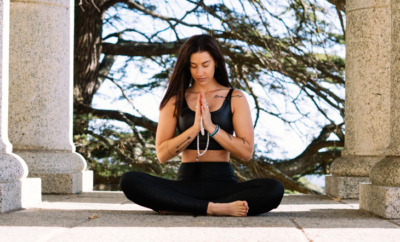The Niyamas Are Your Ticket to Inner Peace (Here’s Why)

Niyamas inner peace featured
The Niyamas are a part of the Eight Limbs of Yoga, which is a set of guidelines defined by Patanjali (an ancient Indian sage) in a sacred text called The Yoga Sutras.
As the second limb of this eight-fold path, the Niyamas describe ways to examine oneself in order to find inner peace and happiness.
The Niyamas are directly translated as “positive duties and observances.” In contrast to the Yamas (which are guidelines as to how to live and act in relation to other people), the Niyamas are more about looking inward.
The purpose of looking inward and observing how you relate to yourself in the world is to discover your true self. Therefore, applying the Niyamas to your life is a great way to look at yourself as if you were an outsider peaking in.
Are you really living to your fullest potential? Are you doing the best you can for yourself and others around you?
Each Niyama can help you discover the answers to these questions and more so that you can deeply learn about yourself and live in the most joyful and fulfilling way possible.
Learn more about the path Patanjali described: The Eight Limb Path Explained in this Beautiful Yoga Video
Understand the Niyamas
Let’s break down each Niyama. There are five – all of which are guidelines as to how we should look inward and observe how we relate to ourselves on a more personal level.
1. Saucha (Purification)
Saucha, also known as purification, represents the clearing and cleansing of the body, mind, and spirit. This clearing creates more space and room in your life for new and better things. In a way, it’s freeing yourself of anything that no longer serves you so that you can find other things that do.
You can also take this niyama quite literally and think of it as keeping on top of your hygiene, which is always a good thing! However, it is also helpful to cleanse your mind and the space around you. Perhaps try to declutter the things in your closet or your office space to help you feel more relaxed.
Keep everything as clear, pure, and simple as possible: This is a great guideline to implement into your lifestyle.
2. Santosha (Contentment)
Santosha, also known as contentment, means being truly happy and content with what you have. It’s essentially the concept that our happiness comes from within.
Life can be very challenging at times, so it is in these moments that practicing this niyama can be the hardest. However, it is important to be able to look at life as a journey and enjoy it as much as possible even during our toughest times.
If you are able to look at the positive over the negative in all types of situations, then you will find that more and more positivity will come into your life.
3. Tapas (Self-Restraint)
Tapas, meaning self-restraint, is all about being self-disciplined. Do you find that you often make promises to yourself that you don’t keep? For instance, do you say, “I’m going to do yoga and meditate every day,” but then you find that you don’t make it past the first week?
This is a fairly common thing that we all do to ourselves regularly, but if we implement a bit of self-discipline, we would definitely get a lot more of our desired goals accomplished.
You can also think of this Niyama in terms of self-restraint (such as not over-indulging in sweets). There will always be areas of your life where you know that you can do better, and practicing Tapas is a great place to start making that happen.
4. Svadhyaya (Self-Study)
Svadhyaya means self-study. Do you really know yourself? Are you aware of what makes you feel good and what doesn’t? Do you know what activities lift you up and which ones bring you down?
If you don’t truly know who you are and what makes you special and unique, then Svadhyaya can help since it is the study of self. In order to truly thrive in life, we need to understand ourselves from the inside out.
Study your tendencies, your body, your likes and dislikes. Learn what makes you YOU. Just sit with yourself and observe. Be mindful and really think about why you do what you do. This will help you to understand your needs and how you can grow and improve as an individual.
5. Ishvara Pranidhana (Surrender)
Ishvara Pranidhana, meaning surrender, is all about letting go and surrendering ourselves to the universe or any other higher being you may believe in. Instead of trying to control every single aspect of your life, accept that whatever will be, will be. Trust that all will be okay in the end.
This does not mean that you should not take action to improve your circumstances or better yourself. It simply means not getting frustrated to the point of madness every time something doesn’t go your way.
If something doesn’t work out, take a step back, breathe, and know that something better will eventually come along. This Niyama teaches us to surrender to what the universe has in store for us.
Applying Each Niyama to Your Life
Living by the five guidelines of the Niyamas will allow you to truly understand yourself in order to grow and improve for the better. It is simply being more mindful as you move through life so that you can understand what is working for you and what isn’t.
If you just take a step back, slow down, and really observe yourself and your habits, you may be very surprised by what you find. Learning more about yourself can help you become happier and more fulfilled because it enables you to dive deep and discover how to live your best life.
Once you discover these things about yourself, you will not only be able to find peace on the inside, but this peace will shine outward toward the people around you as well.
Each Niyama is an excellent tool for self-reflection and discovery. All you have to do is apply them.


This Month's Letter
From the Editor
Monthly motivation and food for
thought from our founder.






























